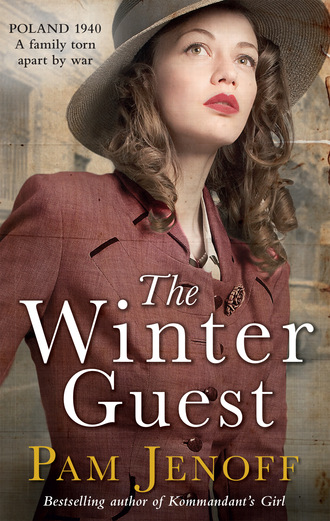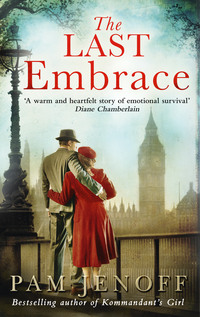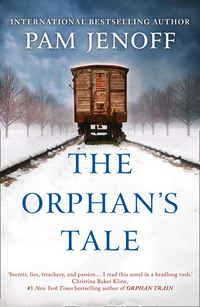
Полная версия
The Winter Guest
He smiled, not offended. “There are different kinds of Jews. Some, like the Orthodox, are more observant than others, and they dress differently.”
That was not quite what Helena had meant, but she was grateful to let it be. Thinking of the empty streets and shuttered shops of Kazimierz, and what the nurse had told her about the ghetto and her sister about the Jews of Nowy S˛acz, she was suddenly nervous for him. Not just a foreigner, but a Jew. The full danger of his situation crashed down upon her. “Did they make you come?”
“No, I volunteered.” He cleared his throat. “That is, the kind of work I do...” She wanted to ask what that was exactly, but she knew he wouldn’t say. “It’s a really big honor and I raised my hand to be considered. At first they said no—they were worried that being Jewish I might let emotions get in the way.” His face was open and honest in a way that she liked, as if he could not hide a single feeling. So unlike here, where everyone kept their eyes low to avoid trouble. “Are you Catholic?”
Helena nodded, picturing the worn old rosary Mama kept in her bed stand drawer, even at the hospital. She had insisted on dressing the children in their best clothes and going to Mass each Sunday. Helena always dreaded the stares of the other villagers, wondering where their father was, speculating that he was sleeping off another night of drinking. After Mama got sick and had gone to the sanatorium, Ruth had stubbornly persisted in herding the children to church. But then their better clothes became too small and threadbare to wear and after Tata died they stopped going altogether. “Everyone is here, more or less.”
He did not speak further, but stared off into the distance. “What are you going to do now?” she asked finally.
He paused. “I don’t know. Stay here for now, I guess. I don’t have much choice with this leg.” He finished the bread and looked at her with a serious expression. “When you found me, was there any sign of anyone else?”
She shook her head. “No one. You were by yourself in the woods. No other people, no plane. And the night before, when I heard the crash, I never saw anything.” She did not have the heart to tell him about the force with which the crash had shaken their house, making the likelihood that anyone else had survived virtually nil.
“No, you wouldn’t have. We flew in low with lights down. It was an engine problem, I think, maybe birds, that got us—not the Germans.” The distinction seemed to matter to him a great deal. “The plane was too low for our chutes to open properly. I doubt the others were as lucky.” Pain washed over his face. His own injuries had been awful, but surely his fellow soldiers had suffered worse. She was seized with the urge to put her arms around him and comfort him, as Ruth might Dorie when she scraped a knee. But offering comfort did not come naturally to Helena and she stopped, caught off guard by the unfamiliar impulse.
He cleared his throat and took her hand in his. “You cut yourself.” The spot where she had caught her hand on the thorny bush while fleeing had reopened from the cold, dry air.
She pulled back sharply. “I’m sorry,” he said quickly. “I didn’t mean to offend you.”
“It isn’t that.” She was ashamed of the rough calluses, the places where her knuckles had split from chopping wood. Ruth always scolded her to take care of her hands. She kept her own soft by wearing an old pair of Tata’s work gloves as she washed and cleaned, rubbing lanolin into her palms and pushing back her cuticles. Ruth took time to do the little things, as though it still mattered and there were young men looking for wives and not that Piotr, her last best hope, had disappeared into the abyss. For once Helena wished that she had listened.
“May I?” He reached out once more. Helena nodded, then extended her hand, allowing him to cradle it in the warmth of his own. He examined it carefully. She felt silly having him worrying about such a little cut, when he was so much more seriously wounded. He dropped her hand and she wondered if he was repulsed by its coarseness. But he reached in his pocket and pulled out a small tube, uncapped it. “It’s a salve,” he explained as he squeezed some into his palm. “Hard to believe that I lost almost everything but managed to keep this.”
“Plus your flashlight and your gun,” she replied pointedly.
He blinked with surprise. “Yeah, that, too.” A moment of awkward distrust passed between them, then evaporated. He took her hand in his own once more, sending shivers of unfamiliar warmth through her as he rubbed the lotion into her skin.
She pulled away again. “I can do it.”
“Of course.” Sam held out the tube. He had strong wrists, flat on top with a few dark hairs curling toward the backs of his hands. She was suddenly mindful of her thick stockings, the darning where they had torn at the knee impossible to conceal.
She finished rubbing in the lotion, studying him more closely now. “Your scar—is it from the war?”
“No, I fell when I was younger,” he answered, a beat too quickly.
She recapped the tube and tried to hand it back. “You keep it,” she said.
“Oh, I couldn’t...”
“Okay, then I’ll give you some more next time.” Next time. The two words hung in the air, waiting for her to refute them.
She looked up, noticing then how the sun had dipped low. “I have to go.” She stood reluctantly. Talking with Sam had been such a reprieve from the dreariness of the rest of her life. “Do you need anything else?”
“Some longer branches, if you wouldn’t mind. I can use them to make a crutch.”
“I saw some out by the knoll.” She returned a few minutes later with several pieces of wood.
“Thank you,” Sam said. “I didn’t expect... That is, I didn’t think people here would be nice.”
“Oh.” She brought her hand to her mouth, feeling her cheeks flush.
“That was thoughtless of me to say,” he recovered hastily. “You have to understand, the Jews who came to America from Poland, well, they left for a reason and maybe they didn’t have the best experience here, or leave with the best impression of the people.” He was talking quickly now, stumbling over his words. But it was more than just awkwardness, or embarrassment over what he had said. He was nervous. “Thank you,” he repeated, somehow making the words sound like something more. She nodded and started toward the door.
“Please wait.” She turned back. “It’s important, you understand, that no one else know I am here.” His voice was grave and she knew he was talking about something larger than his personal safety.
“I promise.”
He opened his mouth to argue and then closed it again and stood reluctantly. “Lena, wait...” She turned back as he struggled to stand, holding on to the wall of the chapel. “The trains,” he said. “Can you see them from where you live?”
Helena hesitated, puzzled. She nodded. From the window of the barn loft where she had always hidden as a child when things got bad one could see the tracks. She went there still when she needed a moment of quiet. The trains had changed lately, increasing their frequency, seeming to move with grim determination. “You can tell a lot from the rail lines—how often they go, in which direction, what kind of cars they are carrying, if they are empty or full.”
“I’ll watch,” she promised.
She noticed the dark stubble on his cheeks and chin, which seemed to have grown thicker during her visit. “I can bring a razor next time,” she said, remembering her father’s, which sat in a tin cup in the cupboard, waiting for the soft peach fuzz on Michal’s upper lip to evolve.
“You mean you’ll... That is...” He paused, conflict washing over his face. “No, you mustn’t come again. It isn’t safe,” he added, and she saw then that he was worried for her safety. He was setting her free, giving her permission to go and not come back. Could she take it? Her shoulders slumped and she was suddenly overwhelmed and saddened, by all that had happened and that she had taken on in coming here—and by the fact that she was now leaving him.
“I’ll see you soon,” she replied firmly, not realizing that she was making the promise until the words had flown from her mouth. Then, before he could argue further, she turned and started down the hill.
Конец ознакомительного фрагмента.
Текст предоставлен ООО «ЛитРес».
Прочитайте эту книгу целиком, купив полную легальную версию на ЛитРес.
Безопасно оплатить книгу можно банковской картой Visa, MasterCard, Maestro, со счета мобильного телефона, с платежного терминала, в салоне МТС или Связной, через PayPal, WebMoney, Яндекс.Деньги, QIWI Кошелек, бонусными картами или другим удобным Вам способом.






